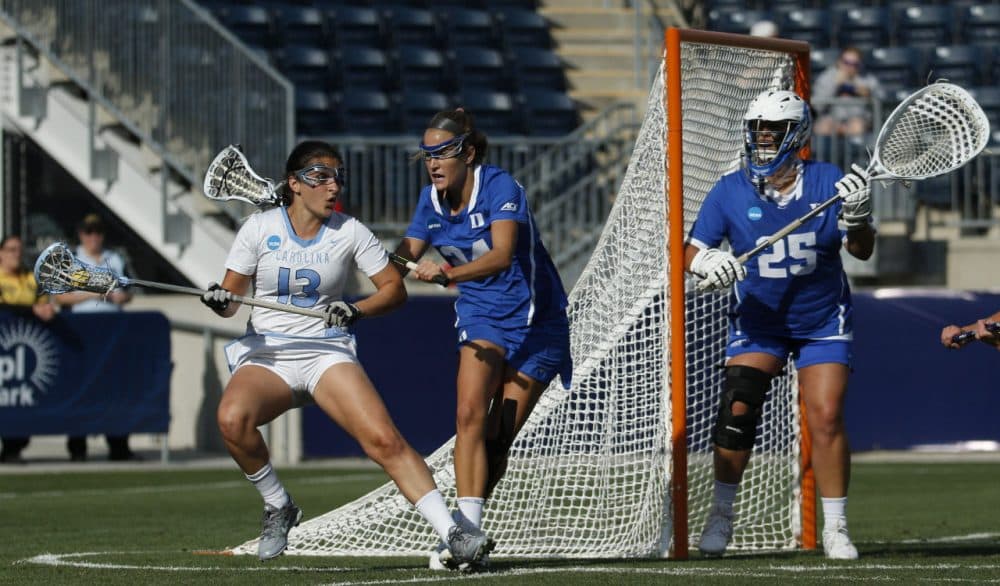Advertisement
Recruiting Middle Schoolers? The Case For NCAA Reform
Resume
Prospective student athletes have started making commitments to college athletic programs earlier and earlier in high school — and sometimes even in middle school. This fall, women’s lacrosse and softball coaches separately proposed policies that would limit recruiting young athletes.
Duke University women's lacrosse coach Kerstin Kimel is one coach leading the push for new NCAA rules regarding recruiting in her sport. She joined Bill Littlefield.
BL: What does it say that the Division I coaches have overwhelmingly endorsed these two proposals?
KK: We hit a tipping point a few years ago. You know, I think we were comfortable recruiting juniors when we kind of slipped into that class, and then as we started to get into the sophomore classes, people became more uncomfortable. And now, as people are really starting to try to evaluate freshmen and maybe even kids younger than freshman year, people really don't feel good about what we're doing. We're hoping to just bring a measure of sanity back into the process, both for the student-athletes as well as the coaches.
BL: This suggests that maybe coaches sometimes are looking at ninth graders or even eighth graders and, somewhere in the back of their heads thinking, "I can't tell how good this kid's gonna be by the time she gets to college. This is nuts."
KK: Absolutely. We're not dealing with a commodity, we're dealing with children and their lives. And let's be frank, the four years that you spend in college are probably four of the most important years in terms of your growth and development as a person. And, if you bring somebody in under one pretense, and that doesn't end up working out because you didn't evaluate them well enough or things changed, it's a tough situation to be in as a coach — it's really tough, it's tougher for the kid.
She really doesn't have a sense of what she wants, and I don't even really want her thinking about that. I just want her to be a kid.
Kerstin Kimel, Duke University women's lacrosse coach
KK: I think that's a fine example. I think it starts earlier than that. I think that when you have kids that are in middle school, if they're not on the right team and they don't have, quite frankly, the finances to support their lacrosse-playing habit — to get them to the right camps in front of the right people — they feel like, "Well, I'm no good, I can't play at this level." And I think that is destructive. I mean, I'm for competition and kids learning how to compete and get knocked down and get back up, but I think there's this kind of rat race mentality that maybe adults are used to from the business world, but you have 13-year-olds trying to navigate that. I think that's really tough. I think making a good choice for yourself, with regard to where you want to study, what you want to study, maybe who you want to play for, where you want to play — all of those things — it's going to involve a measure of stress. However, what we're advocating is let's have kids that are older and a little bit wiser to the world be really thinking about these decisions versus kids that are in eighth and ninth grade.
BL: Let's, just to close this up, put it right at your kitchen table. Your daughter is a freshman in high school who’s grown up alongside the Division I team that you coach. Do you think that she, at this point in her life, is ready to make the decision of where she wants to go to college?
KK: Absolutely not. I have another colleague at another ACC school who has a daughter who's a freshman. Her daughter was playing field hockey, mine was playing volleyball, and we looked at each other and said, 'Could you imagine if our girls were trying to go through the recruiting process? Navigate the first four weeks of high school playing a sport, you know, at the high school level for the first time. Where would you have time to fit in thinking about this?' It's such a big decision, and so I use my Caroline as an example. Look, this kid's grown up in a great college athletic atmosphere. She really doesn't have a sense of what she wants, and I don't even really want her thinking about that. I just want her to be a kid.
This segment aired on December 12, 2015.